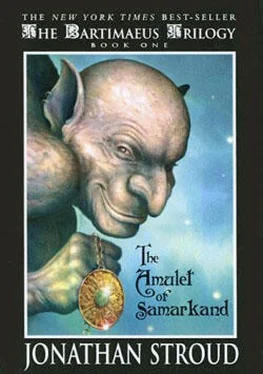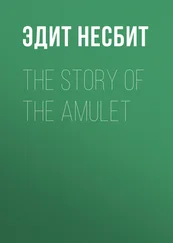The boy descended carefully, one step at a time. The silence and sunlight reassured him and quelled some of his fears. Never having been beyond this point before, he had nothing but nursery stories to furnish his ideas of what might be waiting in his master's study. Terrible images of stuffed crocodiles and bottled eyeballs sprang garishly into his mind. Furiously he drove them out again. He would not be afraid.
At the foot of the staircase was another door, similar to the first, but smaller and decorated, in its center, with a five—sided star painted in red. The boy turned the knob and pushed: the door opened reluctantly, sticking on the thick carpet. When the gap was wide enough the boy passed through into the study.
Unconsciously he had held his breath as he entered; now he let it out again, almost with a sense of disappointment. It was all so ordinary. A long room lined with books on either side. At the far end a great wooden desk with a padded leather chair set behind it. Pens on the table, a few papers, an old computer, a small metal box. The window beyond looked out toward a horse chestnut tree adorned with the full splendor of summer. The light in the room had a sweet greenish tint.
The boy made for the table.
Halfway there, he stopped and looked behind him.
Nothing. Yet he'd had the strangest feeling… For some reason the slightly open door, through which he had entered only a moment before, now gave him an unsettled sensation. He wished that he had thought to close it after him.
He shook his head. No need. He was going back through it in a matter of seconds.
Four hasty steps took him to the edge of the table. He looked round again. Surely there had been a noise…
The room was empty. The boy listened as intently as a rabbit in a covert. No, there was nothing to hear except faint sounds of distant traffic.
Wide—eyed, breathing hard, the boy turned to the table. The metal box glinted in the sun. He reached for it across the leather surface of the desk. This was not strictly necessary—he could have walked round to the other side of the desk and picked the box up easily—but somehow he wanted to save time, grab what he'd come for, and get out. He leaned over the table and stretched out his hand, but the box remained obstinately just out of reach. The boy rocked forward, swung his fingertips out wildly. They missed the box, but his flailing arm knocked over a small pot of pens. The pens sprayed across the leather.
The boy felt a bead of sweat trickle under his arm. Frantically, he began to collect up the pens and stuff them back into the pot.
There was a throaty chuckle, right behind him, in the room.
He wheeled round, stifling his yell. But there was nothing there.
For a moment the boy remained leaning with his back against the desk, paralyzed with fear. Then something reasserted itself in him. Forget the pens, it seemed to say. The box is what you came for. Slowly, imperceptibly, he began to inch his way around the side of the desk, his back to the window, his eyes on the room.
Something tapped the window, urgently, three times. He spun round. Nothing there; only the horse chestnut beyond the garden, waving gently in the summer breeze.
Nothing there.
At that moment one of the pens he had spilled rolled off the desk onto the carpet. It made no sound, but he caught sight of it out of the corner of his eye. Another pen began to rock back and forth—first slowly, then faster and faster. Suddenly it spun away, bounced off the base of the computer, and dropped over the edge onto the floor. Another did the same. Then another. Suddenly, all the pens were rolling, in several directions at once, accelerating off the edges of the desk, colliding, falling, landing, lying still.
The boy watched. The last one fell.
He did not move.
Something laughed softly, right in his ear.
With a cry he lashed out with his left arm, but made no contact. The momentum of his swing turned him around to face the desk. The box was directly in front of him. He snatched it up and dropped it instantly—the metal had been sitting in the sun and its heat seared his palm. The box struck the desktop and lost its lid. A pair of horn—rimmed spectacles fell out. A moment later, he had them in his hand and was running for the door.
Something came behind him. He heard it hopping at his back.
He was almost at the door; he could see the stairs beyond that led up to his master.
And the door slammed shut.
The boy wrenched at the doorknob, beat at the wood, hammered, called to his master in a choking sob, but all to no avail. Something was whispering in his ear and he could not hear the words. In mortal panic, he kicked at the door, succeeding only in jarring his toe through his small black boot.
He turned then and faced the empty room.
Small rustlings sounded all about him, delicate taps and little flitterings, as if the carpet, the books, the shelves, even the ceiling were being brushed against by invisible, moving things. One of the light shades above his head swung slightly in a nonexistent breeze.
Through his tears, through his terror, the boy found words to speak.
"Stop!" he shouted. "Begone!"
The rustling, tapping, and flittering stopped dead. The light shade's swing slowed, diminished, and came to a halt.
The room was very still.
Gulping for breath, the boy waited with his back against the door, watching the room. Not a sound came.
Then he remembered the spectacles that he was still holding in his hand. Out of the clinging fog of fear, he recalled that his master had told him to put them on before returning. Perhaps if he did so, the door would open and he would be allowed to climb the stairs to safety.
With trembling fingers he raised the spectacles and put them on.
And saw the truth about the study.
A hundred small demons filled every inch of the space in front of him. They were stacked one on top of the other all over the room, like seeds in a melon or nuts in a bag, with feet squishing faces and elbows jabbed into bellies. So tightly were they clustered that the very carpet was blocked out. Leering obscenely, they squatted on the desk, hung from the lights and bookcases, and hovered in midair. Some balanced on the protruding noses of others or were suspended from their limbs. A few had huge bodies with heads the size of oranges; several displayed the reverse. There were tails and wings and horns and warts and extra hands, mouths, feet, and eyes. There were too many scales and too much hair and other things in impossible places. Some had beaks, others had suckers, most had teeth. They were every conceivable color, often in inappropriate combinations. And they were all doing their best to keep very, very still so as to convince the boy that nobody was there. They were trying extremely hard to remain frozen, despite the repressed shaking and trembling of tails and wings and the uncontrollable twitching of their extremely mobile mouths.
But at the very moment the boy put on the spectacles and saw them, they realized that he could see them too.
Then, with a cry of glee, they leaped at him.
The boy screamed, fell back against the door and sideways onto the floor. He raised his hands to protect himself, dashing the spectacles from his nose. Blindly he rolled over onto his face and curled himself up into a ball, smothered by the terrible noise of wings and scales and small sharp claws on top, around, beside him.
The boy was still there twenty minutes later, when his master came to fetch him and dismiss the company of imps. He was carried to his room. For a day and a night he did not eat. For a further week he remained mute and unresponsive, but at length he regained his speech and was able to resume his studies.
His master never referred to the incident again, but he was satisfied with the outcome of the lesson—with the well of hate and fear that had been dug for his apprentice in that sunny room.
Читать дальше









